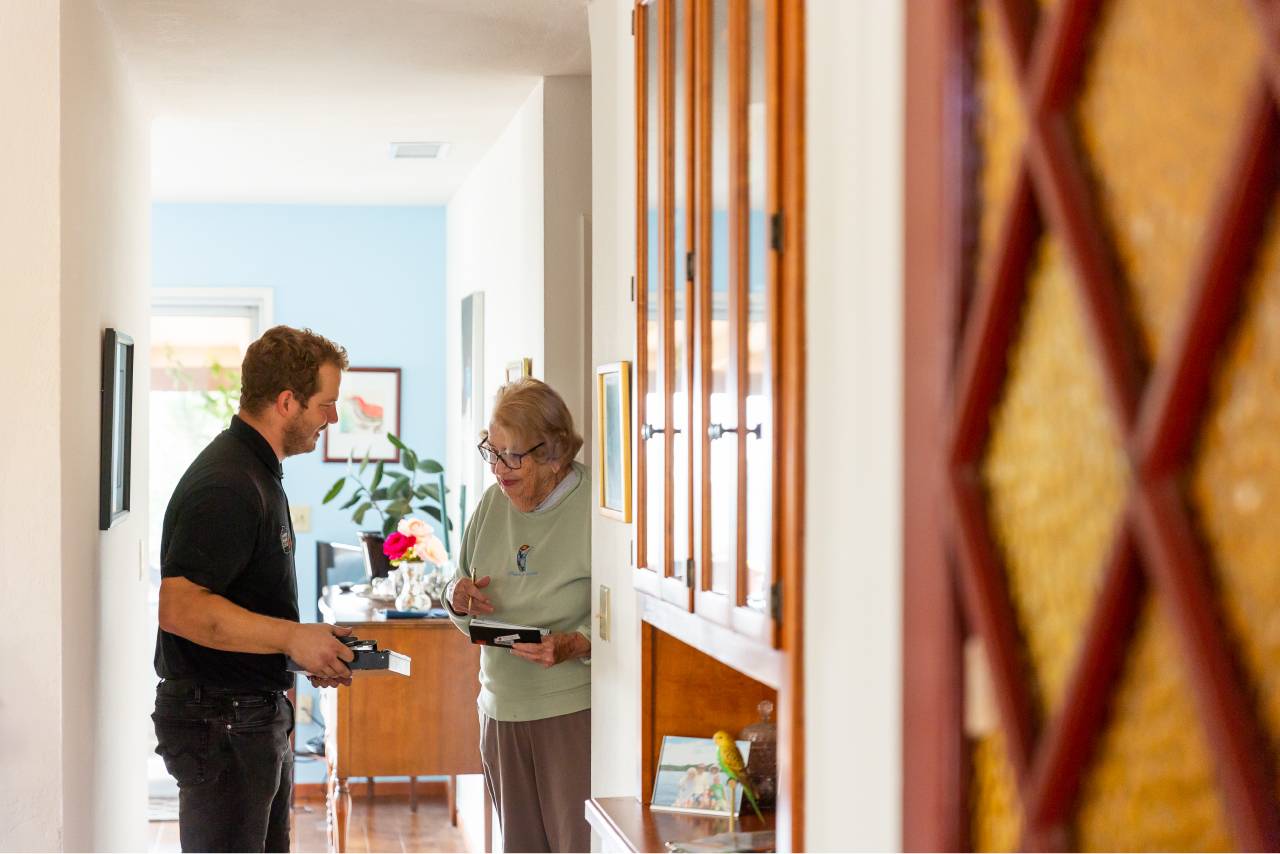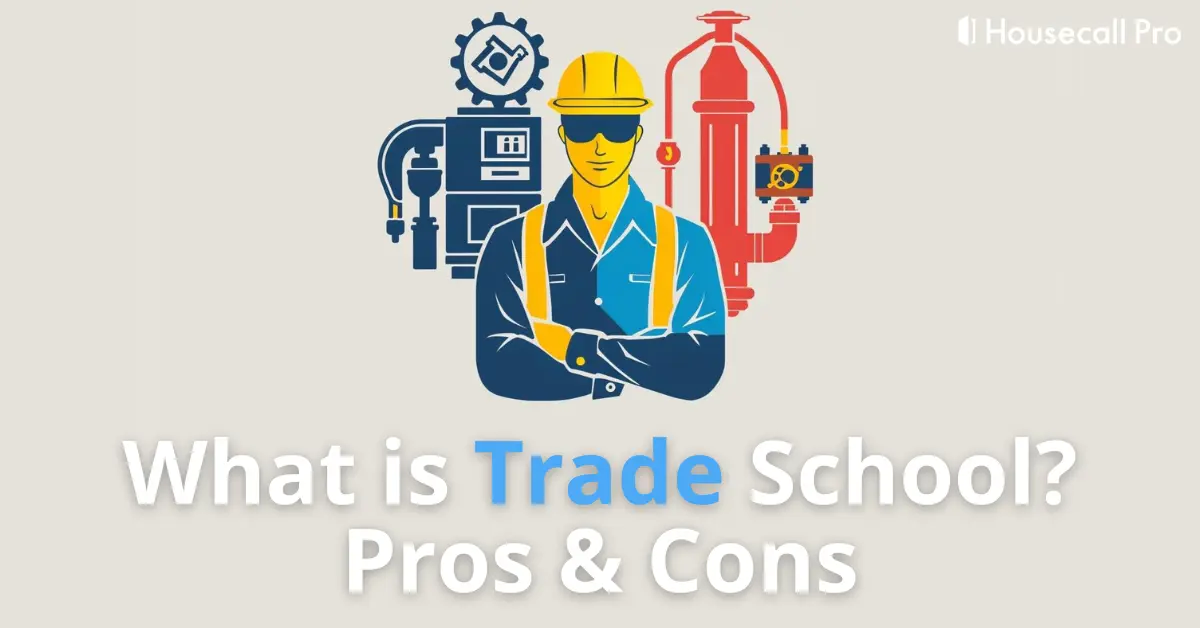
In our recent article, Plumber Sales Tips, we armed home service professionals with tools to build trust and increase sales. The first step to avoid delivering a typical sales pitch is by establishing a relationship with the customer.
- Let the customer know you’re on the way
- Show up in a clean uniform
- Greet the customer by name, and give them your name
- Find common ground once you arrive to set them at ease
- Listen to their needs before going directly to the problem
Customers want to hire a professional they like and trust. But being likable is not enough, home service professionals have to be ready to move past purchase obstacles keeping the customer from signing an estimate and approving a recommended service.
Move beyond the pitch to solve the customer’s problem
1. Customers Fear a Sales Pitch
People are naturally wary of salespeople. The good news? Home service professionals are skilled craftsmen. Why approach service calls with a sales mentality; instead, provide a solution to a real customer problem.
- Listen for Pain Points – Do customers complain of running out of hot water? Are they concerned about energy efficiency? They may be prime candidates for a tankless water heater upgrade.
- Educate Customers – Help customers understand how their plumbing works. If they are experiencing constant leaks from excessive pressure, show them how a pressure reducing valve can help, but also share how city water pressure is too high when it enters their home causing worn plumbing fixtures and recurring leaks.
- Show Empathy – Investing in-home service upgrades or new systems is a big expense. Don’t be afraid to offer personal recommendations. Share how an air purifier or water filtration system has helped your family.
Using Technology: Show customers product videos, diagrams, reviews, and specifications on the plumbing and HVAC systems being recommended. People are better able to understand complex issues with visual tools and resources.
2. Customers are Uncertain of You and/or the Product
The ability to confidently sell a service or product starts with trust and relationships. Once a home service professional is in the home, being able to speak as an expert and highlight company strengths help the customer feel they are making the right choice.
- Be the Expert – Home service professionals have to know product and service offerings inside and out. Being able to recommend an investment such as a ductless mini-split has to come with details about how it works, how it is made, proper maintenance, as well as the comfort it will bring their family.
- Share the Company Story – A deep and up-to-date knowledge of product and service offerings is crucial, but don’t leave out the personal side of the brand. Customers like working with community minded organizations and companies that take care of their employees. Sharing what sets you apart from competitors adds another layer of trust through personalization.
- Instill Confidence – Ensure that every team member is confident in the services and products. If they are suggesting upgrading to a new HVAC system, it is integral to have all of the answers about what the job entails, benefits of the recommended system, how long it will take, and why it is the best solution.
Using Technology: Leverage past customer testimonials or reviews, product images, and product descriptions. Chances are, the customer has done some research. Become a part of that process and take advantage of addressing concerns and reduce uncertainty face to face.
3. Customers Distrust Home Services Professionals
There is an inherent distrust of plumbers and HVAC professionals. If a customer has not had a bad past experience with a home service professional, it is likely they have heard of one from a friend or family member. Building trust starts before entering the home and continues long after the job is complete.
- Keep Customers Informed – Alert customers prior to arrival, give advance warning if the appointment window has changed or if running late, and never leave the job without telling them why and for how long.
- Check-in During Service – Communicating throughout the service helps alleviate concerns when unexpected costs arise. When repairing a leak, be sure to address possible obstacles. If the scope of work changes, be sure to share with them as it happens instead when it is time to present the final bill.
- Follow Up – After a job is completed, be sure to follow up and check on their experience. Making sure customers feel cared for after they have paid the bill shows them the home service professional cares about the quality of the work. It also allows for fixing problems that may otherwise be shared through a negative review.
Using Technology: Communicate in real time with customers via the platforms they prefer, such as email, phone calls, and text messages. Be sure to follow up asking for feedback about their experience giving them a place to voice concerns privately.
4. It’s not in the Budget
With large purchases, it is often thought price is the biggest deterrent. While budgeting for home service repairs and upgrades holds customers back, if they feel they are getting value for their money, they are more likely to move forward.
- Ask the Right Questions – If customers are concerned about cost, steer the conversation towards the value of service. Ask what they feel the perceived value is worth if monthly payments would help, or how the process could be made more convenient.
- Use Positive Words – Instead of having customers sign a contract, have them sign an agreement. When discussing price, frame it as an investment — home upgrades like new HVAC units, water filtration systems, and tankless water heaters will increase the value of the home.
- Offer Multiple Options – When available, give customers a choice between at least 3 options. Show side by side comparisons as good, better, and best. When presenting options, talk about each proposal’s value rather than cost.
Remember, customers may not say yes right away, or maybe they will opt to make a small repair for the time being. By helping to guide their decision based on value and solving their pain points, when they do move forward, you will be at the top of their list. Customers appreciate honesty and choice.
Using Technology:
Having the capability to draft and send an estimate at the time of service is crucial to customer service; it shows the customer you want them to have a choice and are not pressuring them to just make a sale. Sending estimates while on site also ensures that any clarifications or missed answers can be addressed before leaving them to review the estimate on their own.
Some Final Notes
Once a home service professional has established trust and is in the home with a customer, utilizing technology can help advance the sales process. Utilize on-site mobile technology with estimation, product demonstrations and descriptions, and showcase past customer testimonials. Leave the customer with a lasting impression of who you are so they will not even think of choosing an alternative home service professional.





